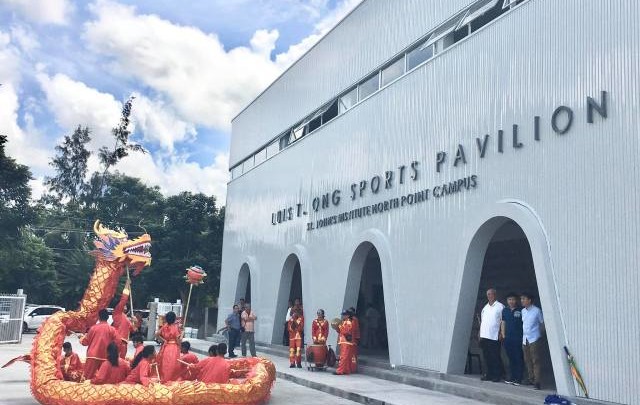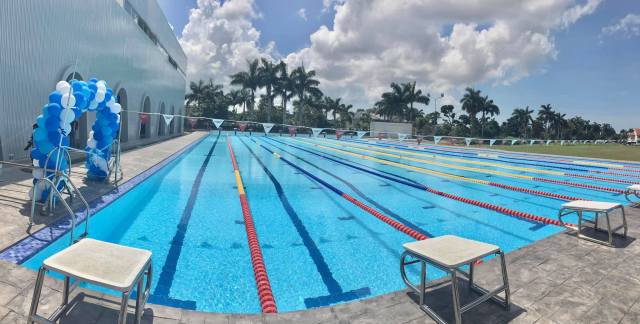
Celebrating The Vision of Huaming’s Founders Gratefully
Reposted from Fr. Joel Tabora, S.J. Blog
[Homily: Mass on the Occasion of the Inauguration of the Luis T. Ong Sports Pavillion and the Groundbreaking of the New St. John’s Institute North Point Academic Building, Talisay City, 20 October 2019.]
We come together this morning at this Northpoint Campus of Huaming or St. John’s Institute (SJI) on the 29th Sunday in Ordinary time in thanksgiving for the inauguration of the Luis T. Ong Sports Pavilion and the groundbreaking of the new SJI North Point Academic Building. And what better way is there of giving thanks than through a festive gathering of Huaming’s academic community, its alumni, benefactors, and friends at this Eucharistic celebration led by our Fr. Arnold Deletina, the parish priest of Our Lady, Queen of Peace?
We give thanks for the generosity of Mr. Luis Ong whose quiet, humble life of trading in fishing equipment allowed him to send his three daughters to Huaming and then to contribute substantially to this sports center dedicated to the proposition of mens sana in corpore sano – in a healthy body is a healthy mind. In the prospect of developing healthy bodies through sports and athletics, there is prospect of developing healthy human beings who work hard to develop themselves in physical, personal and spiritual excellence, and in life to run the race for the greater glory of God.
Today, we thank God in this Eucharistic celebration not only for Mr. Ong, but for the very many other benefactors who have contributed of their time, talent and treasure – and continue to do so – to build up Huaming both in this North Point campus but also in its home campus in Bacolod. It is that generosity that allows us this morning to break ground for Huaming’s new academic building. Breaking ground is a celebration of the hope we share in supporting the education of Huaming’s learners in academic excellence according to the vision of Huaming’s founders.
In our second reading for today, St. Paul says to Timothy, “Remain faithful to what you have learned and believed, because you know from whom you learned it, and that from infancy you have known the Sacred Scriptures, which are capable of giving you wisdom for salvation through faith in Jesus Christ” (2 Tim 3:14). Remain faithful to the Good News of Jesus Christ. Use the Word of God “for teaching, for refutation, for correction, and for training for righteousness, so that one who belongs to God may be competent, equipped for every good work. … Be persistent, whether it is convenient or inconvenient; convince, reprimand, encourage through all patience and teaching” (2 Tim. 4:2). Is not what Paul is saying to Timothy at the heart of the original vision of Huaming’s founders?
What was this original vision of Huaming’s Founders? It is good that on an occasion like this we recall it, since what brings us together today is not just gratitude for a new building and hope for yet another academic building. What brings us together is a vision “that we have known from infancy” imparted to us by Msgrs. Liu and Su, a vision, as recently summarized by Mr. Fred Barcelona, Chairman of the Board, that was to “unite the Filipino-Chinese communities in Bacolod, bring them to the knowledge and love of Christ and the fullness of Christian life and integrate them into the broader society while preserving was is true and noble in their cultural heritage.” That vision already expressed itself in 1955 in the Chinese Catholic Center, but later also in 1959 in the establishment Huaming or St. John’s Institute of Bacolod. Today, in grateful celebration as well of the 60th anniversary of the founding of St John’s Institute, we wish to renew ourselves in and draw inspiration from this vision of Huaming’s founders. There are five points in that vision:
- To unite the Filipino-Chinese communities in Bacolod: to bring the Filipino and Chinese communities, differentiated by religions, national histories, lived human histories, languages, values, ways of regarding family, work, learning, and life, in their disparity together, and somehow to unite them. This was a goal that inspired the erstwhile Chinese Catholic Center and the establishment of Huamingthe school.
- To bring them to the knowledge of love of Jesus Christ: this was a sacred goal of evangelization, to bring the Chinese to the Good News of Jesus Christ, to introduce them personally to Jesus Christ dwelling in their hearts through faith, that they being rooted and grounded in love that “may have the power together with all the saints to comprehend the length and width and height and depth of His love” and to “know the love of Christ that surpasses all knowledge” that they might be “filled with the fullness of God” (cf. Eph. 3:18). To bring Filipinos to a deeper knowledge of Christ and a more faithful following of him.
- To bring them to the fullness of Christian life. Jesus said, “I have come to bring life, life to the full” (John 10:10). The Filipino and Chinese communities united in the knowledge and love of Jesus Christ were to be led by the light of the Spirit (Huaming) to the fullness of life. This was not a life truncated by poverty nor the mindless pursuit of power and money, diminished by arrogance and meanness, or sullied by corruption and deceit; this was life-made-full in love and service of the other and in the pursuit of that common good where without exception all thrive in shared humanity.
- To integrate them into the broader society. The united Filipino and Chinese communities are to be integrated into “broader society”: the broader society of national life, or of life today in the midst of our Asian neighbors, where we must integrate ourselves with our neighboring countries, including China, but in so doing, bring with us the Light of Huaming, the light of our faith, the light which allows us insight into the fullness of life.
- All this “preserving what is true and noble in their cultural heritage.” Amidst the Filipino cultural heritage, the richness of Chinese culture is to be preserved. This includes the cultivation of the Chinese language, and the preservation of such values as harmony, the proper balance, and coordination between things, benevolence, courtesy, wisdom, honesty, and loyalty.
It is a wonderful vision, and today, 60 years after the founding of Huaming, all the more relevant as the vision that binds us together and lights our way into the future. For today, the Chinese and Filipino communities still need to come together in shared community. The Chinese and Filipino communities still need to be evangelized or re-evangelized into the love and power of Jesus Christ. The Chinese and Filipino communities, from the strength of their shared genius, need to contribute to the establishing the fullness of life which Jesus brings where no one is hungry, no one is ignorant, no one is unproductive, no one is disrespected, no one is uncared for. The Chinese and Filipino communities in Bacolod need now to help navigate our way as a nation into a future with our Asian neighbors, but especially with China, that is today not just a Middle Kingdom, but a global power, challenging the civilizations of the West. From Huaming we pray we be able today to do our part knowing Jesus Christ, who in teaching us of the fullness of life, also counseled us to be “wise as serpents and gentle as doves” (Mt 10:16). In dealing with even the giants we must do so in self-possession, with harmony, without losing the balance between things, with benevolence, courtesy, wisdom, honesty, and loyalty.
Today in thanksgiving we draw strength for the future from the vision of our founders, and from the imperative of Huaming, the Light: “Be persistent,” Paul said, “whether it is convenient or inconvenient; convince, reprimand, encourage through all patience and teaching” (2 Tim 4:2). Above all, he said, “Put on love, which is the bond of perfect unity. Let the peace of Christ rule your hearts, for to this you were called as members of one Body.” (Eph. 14)


